For Colored Girls: A Movie Review
I never saw the play, “For Colored Girls…” when it came out in the seventies, and I have not read Ntozake Shange’s book adaptation, so I am judging “For Colored Girls” solely on its merit as a movie. The movie was adapted from the play, and it is centered around the trials and tribulations in the lives of seven black women who are all –for the most part– aspiring in their own way to better themselves. They come from various stations in life, mostly poor to middle-class, but they are all united by their african American ancestry, and the challenges that they must overcome. And while the struggles that Shange’s characters go through certainly are valid and reflective of the experience that many black women go through, I think that her overall perspective is a bit skewed in that she presents the black male as the source of ALL their problems. Even in the character of Jo (played by Janet Jackson) an educated, very successful black business woman who runs her own company (with a cold iron hand), we see that the only problem that stands in her way is her husband Carl, played by Omari Hardwick, who is not as successful, and somewhat of a leech who is harboring a very dangerous secret that could destroy both of them. The issue/challenge of being a female CEO, or even of being African-American in a caucasian male-dominated playing field is not addressed at all. Unfortunately there is only one black man in the movie, For Colored Girls, who comes off as anything more than a dog, and that is Hill harper who plays Donald, the supportive husband of social worker,
kelly (played by Kerry Washington). Never-the-less, For Colored Girls is a very interesting, and well executed movie overall.The Play, For Colored Girls Who Have Considered Suicide When The Rainbow Is Enuf (wheeew) had a very experimental format (Ntozake Shange refers to it as a “Choreopoem” in her book adaptation) wherein seven woman who are each designated by a color of the rainbow tell their stories by reciting a series of poems, and at the end they bring their stories together in a ritualistic female bonding. Now the movie itself tries to mix straight story and dialogue with individual poetic recitation. And for the most part, this style of delivery works, but there are a couple of glaring exceptions where the switch between dialogue and soliloquy just doesn’t work at all, and ends up dragging the movie down. This is most evident in the case of the character Nyla, played by Tessa Thompson. Nyla is a young teenager perhaps 17. She is a very talented dancer who takes classes at a local school. Early in the movie there is a scene where she and a group of other students are sitting around doing warm-up stretches at the studio before the teacher (Anika Noni Rose) arrives. They are laughing and joking and talking about “boys'” the way you might expect teenage girls to do. Then at one point, Nyla launches into her soliloquy, and she drones on for a good six or seven minutes about having a sexual experience with five brothers at the same time on the night of her high school graduation prom. She stretches and bends, and her body arcs with pleasure as she recounts the experience to her captivated peers who giggle and make snide remarks, but the content and duration of her speech seem too heavy and drawn out for her to carry as a soliloquy. I don’t know whether it was the content of her soliloquy, or her delivery, or the way it isolated her from the other actors around her and the scene itself; but it came off as very sluggish, and I found myself not particularly caring about what she was saying, and waiting for her recitation to be over. I do not mean to say that Tessa Thompson did a bad acting job, because that was not the case at all. Throughout the rest of the movie you can clearly see that she is a talented actor. But perhaps her soliloquy would have worked better if it were totally removed from the scene some how. Classically when you have a soliloquy in a play, either the actor is alone, or there is a spotlight on the actor while the other actors are shrouded in darkness.
Now, at the other end of this spectrum was Lorretta Devine, who plays the character, Juanita. Juanita is a mature black woman who spearheads an outreach program for the women in her community. She wants to empower and educate women on issues of sexuality, AIDS, motherhood, employment, etc. But even as she reaches out to help other women, she herself must deal with the issue of needing a man in her life in order to validate her worth as a woman.
Now, it may have been the luck of the draw, but Devine’s transition from dialogue into soliloquy was damn near flawless. She totally enraptures you with the heart-felt portrayal of her character, and she manages to pull off her soliloquies without isolating the other actors, or the audience.
Other notable performances were given by Woopie Goldberg, Thandie Newton, Anika Noni Rose, Phylicia Rashad, and kimberly Elise.
Whoopi Goldberg plays Alice, the religious fanatic mother of Tangie and Nyla. Her character is not quite what I am used to seeing from Whoopi. When she is not being intentionally funny or satirical, Whoopi’s characters are usually even keel and serious-minded; sometimes espousing great wisdom. But Alice is quite loony, and not in a funny way. She is the extreme of all those black, church-going, Good Book-thumping, holier-than-thou condemnationists who see Satan’s work everywhere around them; the type of person that becomes thoroughly submersed in God and religion in order to bury the darkness that they feel within themselves.
Alice’s daughter, Tangie, is an emotionally numb and uncaring nymphomaniac whose self-esteem is intimately linked to her ability to lure men into her bed and then discard them. She is afflicted with the perspective of the stereotypical male. Tangie is portrayed convincingly and unapologetically by Thandie Newton. There is a visually stunning scene where Tangie faces-off with her mother and has a revelation about her life. She is sitting on a wooden chair scantily clad in a peach-colored robe. She is slightly hunched forward, her hands resting on her knees. Her legs are open, and her feet are planted solidly on the floor. She is emotionally, mentally and physically spent, and the scene is very much reminiscent of a Lawrence Jacob painting. Here Newton and Goldberg, who is sitting exhausted on the floor behind her to the right with her back resting against a wall, do a sort of double soliloquy, a two-person poetic recitation, which is an interesting idea in theory, but doesn’t pan out quite well–Whoopi’s part is a bit weak. I like Whoopi Goldberg as an entertainer, but I am not a huge fan of her acting.
Phylicia Rashad plays nosey neighbor, Gilda. She is the one who brings wisdom to bear on the drama and proceedings in the lives of the various “colored” women. Rashad actually plays the role that I would have expected to see Whoopi playing, and she plays it with a well-seasoned ease.
kimberly Elise gives a spectacular performance as Crystal, the physically abused mother of two very young children who works hard and tries her very best to hold-out and keep her family together, hoping that her alcoholic, total loser-of-a-man (played by Michael Ealy) will “come around” and be the man that she believes in… but she learns too late that there comes a time when we have to stop holding our breath.
And last, but not least, I have to say a bit more about Janet Jackson in this movie. Miss. Jackson, as mentioned earlier, plays Jo. First of all, Jackson’s soliloquy was the highlight of her whole performance; as well a soliloquy should be. The camera just zoomed right on into her face, and her gorgeous hunk of a husband Carl (played by Omari Hardwick) whom she had been talking to, was totally left out of the frame. The rest of Miss Jackson’s performance; however, particularly that of high-powered CEO, left a bit more to be desired. Now it is quite possible that I was distracted by the bizarre feeling that Michael Jackson’s ghost was lurking behind almost every shot of Janet’s face. It was almost like looking at a female version of Michael. The stoic and almost androgynous appearance of Janet’s character certainly did nothing to distract from this bizarre perception. Jo comes off as an emotionally distant and alienating woman, very uptight and a bit of a bitch. In the beginning, she does not relate well to other –less successful– colored women, or the struggles that they may face. Her whole attitude is “I had the same challenges as a black woman that they did, and I managed to become successful so they should be able to do the same.” When Juanita (Lorretta Devine) comes to her seeking funding for a community project, Jo’s reply is very much, I gave at the office.
The women portrayed in For Colored Women have a variety of tumultuous issues to deal with that run the gamut from rape to abortion, to HIV, to bad relationships and religious fanaticism, and a mother’s worse nightmare. But by the end of the movie, these women begin to see the light beyond their trials and tribulations, and they begin to find strength and solace in the powerful bond of sisterhood that unites them all.
In spite of its negative portrayal of African-American men, I would still recommend seeing the movie For Colored Girls. It has a very unique and creative delivery, and lots of good performances. I love poetry in general, and I will definitely be checking out the book. Let me know what you think!



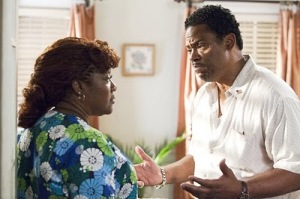

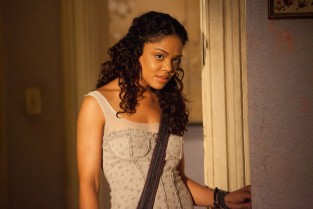
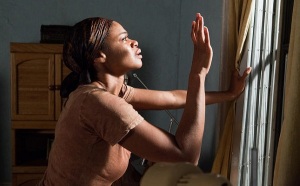





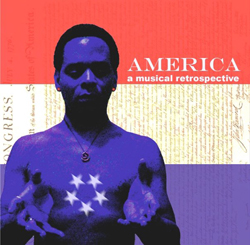





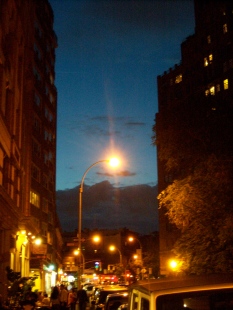

Thanks for your review. I would like to counter the sentiment that this movie may come down hard on black men. A critique I’ve heard after the films “The Color Purple”, “The Family that Preys” and “Precious” hit the scene. This is a valid concern, however I think the point that hopefully comes across in theses films to African American male spectators is that if the “black” family unit or whenever any household is dysfunctional or the foundation is cracked it becomes even harder for a female/male to conquer the other outside challenges that society may impose upon you. For instance I thought this film would deal with problems that were unique to the black community but ask any social worker and there are people from all backgrounds that face these similar issues.